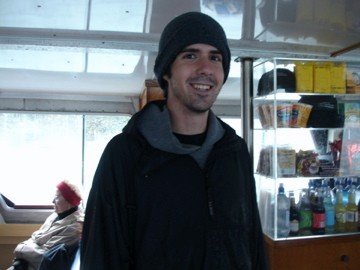
My daily rounds on google reader led me to this crazy article about a scientist/programmer named David Cope who has created software that writes music. He is about to unveil his newest software model, Emmy Howell, an update from his original Emmy, a program that "produced thousands of scores in the style of classical heavyweights, scores so impressive that classical music scholars failed to identify them as computer-created."
Whoa.
What the original Emmy did (as far as I can tell) was use an algorithm perfected through Cope's intense analyzation of famous composers' tendencies and methods. Emmy could then generate her own compositions based in the style of a given composer. And that was all the way back in the 80s! The original Emmy is, in her own right, a pretty crazy invention.
"If a machine could write a Mozart sonata every bit as good as the originals, then what was so special about Mozart? And was there really any soul behind the great works, or were Beethoven and his ilk just clever mathematical manipulators of notes? Cope’s answers — not much, and yes — made some people very angry. "
So, if that weren't enough, now the new Emmy Howell can apparently write wholly original classical music. I'm not going to just recount the article, but the implications of this development are quite interesting. I didn't have any idea that such a thing was possible at all, much less right now. What could be possible in the future?
To me, it seems that classical music is the most mathematic of the major styles, and therefore the most easily imitated by computers, but perhaps all genres (lyrics aside) are equally penetrable. Jazz music, especially improvisation, is somewhat mathematical as well, manipulating scales and patterns. With in-depth cataloging of what certain jazz greats tend to play over specific changes, couldn't a program solo like Dave Brubeck? Or, for example, pop music has generally straight-forward chord progressions. Why couldn't a computer churn out some Top 40 hits? I find it hard to believe that a computer could create music that could blend the unpredictability and cohesion of say, Abbey Road. But, as Emmy and her daughter have suggested, maybe that's just my wishful thinking.
(Here come the rhetorical questions.)
Even beyond music, could a computer write a story? It seems impossible on the one hand, but aren't words essentially just little building blocks themselves? Though the programming would seem insurmountable, maybe the rules of word assembly to create meaning are not as advanced as we like to tell ourselves.
Or, could a computer paint a picture? We could give it a photograph and then it would analyze the pixels and use a robotic arm to paint a replica. Do we already have that? Furthermore, if we have a painting done by a computer, an exact, beautiful transcription of a real thing, does that mean it's good? Or is art something more than that? How can we tell? What if we didn't know the painting was done by a computer? Is Emmy's classical sonata better than Bach if it sounds better?
If nothing else, Cope's programs remind us that the same elements exist for everyone, people or computers. We all have access to the same notes, the same words, and the same colors. It's only in putting these elements together that we get anywhere. Wild stuff. I feel like we may be hearing more about Mr. Cope and Miss Howell soon.
In the meantime, here's an awesome song (from the Soul Sides blog) that no program could write...at least not yet.
The Dramatics: Whatcha See is Whatcha Get
End transmission.

No comments:
Post a Comment